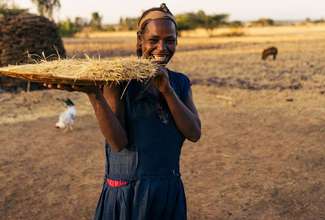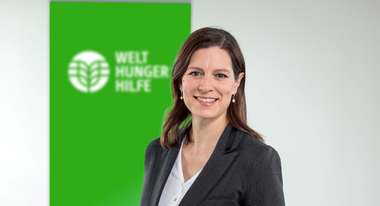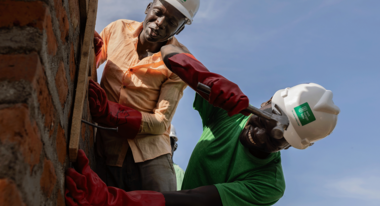Download the 2023 annual report in German. The English version will be available here as soon as it has been published.
Annual Report
Welthungerhilfe (WHH) under the microscope: The annual report provides transparent insight into our work, explaining how it is financed and where and how donations are used.
Zero hunger by 2030 – WHH aligns our work with this sustainable development goal. Because a life without hunger is a human right and a world without hunger is possible. For more than six decades, we have been committed to this goal with great passion, energy and expertise. Once again, we were able to increase our funding volume in 2023 compared to the previous year.
In 2023, we experienced massive crises, wars and disasters in many places, exacerbating hunger worldwide. The consequences of climate change can be felt everywhere and seen in the form of droughts, floods and other extreme weather events. The year was also marked by ongoing conflicts, including those in Sudan, Ukraine, and the Gaza Strip.
In many countries where we operate, we responded with emergency action in 2023 – but also with long-term approaches and a focus on innovative strategies and instruments. The majority of our work takes place in regions beset by conflict. In countries such as Afghanistan, South Sudan and the Central African Republic, poverty, hunger and conflict are intertwined and exacerbated by climate change.

We remain active even under challenging situations, such as the Taliban takeover in Afghanistan or the devastating earthquakes in Türkiye and Syria. As a result, we are also considered a reputable and reliable voice in political discussions.
Mathias Mogge WHH Secretary GeneralAdequate food is a human right. Despite all the bad news about disasters and conflicts, we can overcome hunger if there is the political will to create security, open up the scope for effective action, and provide resources.
We still have hope. Our main focus is on working with populations and other stakeholders to make food systems sustainable and resilient. In 2023, we made great strides in this area. This cooperation resulted in many people eating safely and healthily despite the climate crisis and conflicts. We will continue to combine humanitarian action with sustainable development and peacebuilding approaches in the future.

Many people in the Global South feel the direct impact of crises on the state of the food system daily. It is therefore all the more important to support them in strengthening their resilience
Marlehn Thieme WHH PresidentWe emphasize supporting young people under 25, who comprise the majority of society in many countries. They often have little influence on social decision-making processes but, in some cases, already have to take on a great deal of responsibility. "We want to focus on their needs and wishes, but also on their abilities and potential," says Marlehn Thieme, WHH President. To this end, we have developed special programs such as Skill Up! or the Green Colleges, which provide young people with vocational training.
To make all this possible, we cooperate closely with other civil society actors and partners from government, academia and the private sector. "Together, we can achieve more," says WHH Secretary General Mathias Mogge. "In the area of forward-looking humanitarian action, we are working with four German organizations and 12 local partners to find solutions." Carrying out emergency action in Ukraine and the Gaza Strip is only possible in close cooperation with partners.
In view of the ongoing global challenges, our special thanks go to our supporters because solidarity with people in need has not waned. In 2023, 87.7 million euros in donations and 266.5 million euros in institutional grants were raised for WHH's work.
Support for 16.4 million people
In 2023, WHH supported around 16.4 million people in 36 countries with 630 international projects. Many people are now harvesting and generating more, which means they can feed themselves better, have clean drinking water, and fall ill less often. For children, this support means the opportunity for better physical and mental development – and, thus, better self-determination in their future.

WHH spent 355.3 million euros in 2023, 322.5 million euros of which went directly to international project funding. The rest went towards advertising, general public relations, international project support, administrative expenses, campaigning, education, and awareness work.
Facts and figures about WHH in 2023
The independent auditing company BDO AG has issued an unconditional audit certificate for the annual financial statements and management report of Deutsche Welthungerhilfe e.V.
FAQ
How many projects did WHH work on in 2023?
What is the breakdown of expenditure on projects?
90.8% of all income from donations and grants flows directly into international project funding. We used 3.8% for advertising and general public relations, 2.2% for administration, and 2.4% for international project support – we used 0.8% for campaigning, education, and awareness-raising work.
Your donations are essential for us to be able to apply for further funding from public donors, such as the Federal Ministry for Economic Cooperation and Development (BMZ), the Federal Foreign Office (AA), the European Union (EU), or the United Nations. Generally, every donation is quadrupled – we can turn 100 euros in donations into up to 400 euros in project funds.
Who are the institutional donors of WHH?
In 2023, WHH again received large grants from institutional donors and was thus able to expand its project funding. These donors include:
- AA (German Federal Foreign Office)
- Alliance 2015 partner organisations
- BMEL (Federal Ministry of Food and Agriculture)
- BMUV (Federal Ministry for the Environment, Nature Conservation, Nuclear Safety and Consumer Protection)
- BMZ (Federal Ministry for Economic Cooperation and Development)
- charity: water
- EU ECHO (European Commission Directorate-General for Humanitarian Aid and Civil Protection)
- EU INTPA (Directorate-General for International Partnerships)
- ENABEL (Belgian Development Agency)
- FAO (Food and Agriculture Organization of the United Nations)
- FCDO (Foreign, Commonwealth and Development Office of the United Kingdom)
- GIZ (German Society for International Cooperation)
- KfW Entwicklungsbank
- NORAD (Norwegian Agency for Development Cooperation)
- OCHA (Office for the Coordination of Humanitarian Affairs)
- Patrip Foundation
- PRM (US Bureau of Population, Refugees, and Migration)
- SIDA (Swedish International Cooperation Agency)
- UNDP (United Nations Development Programme)
- UN (other)
- USAID (United States Agency for International Development)
- WFP (World Food Program of the United Nations)
- World Bank
What is WHH's strategy?
We have set ourselves a clear goal based on the Sustainable Development Goals (SDG): Zero hunger by 2030. We are working towards this goal to make our vision a reality: Everyone has a right to a self-determined life in dignity and justice, free from hunger and poverty. The detailed strategy of WHH can be downloaded as a publication.
To what extent is WHH making its work transparent?
WHH centers our work on transparency and quality, economical and targeted use of donations and verified information. For this reason, the German Central Institute for Social Issues (DZI) has awarded us the seal of approval for donations.
Beyond this, we also attach great importance to economic efficiency and transparency. Our annual report shows in detail what we use all donations for and provides a direct insight into our work. As part of the "Transparent Civil Society Initiative," we disclose additional information, such as our complete Articles of Association, the names and functions of key decision-makers, our organizational structure and much more.
What information can be found in the management report?
As an aid organization, private donations and contributions to WHH are indispensable for implementing its statutory mission – the fight against hunger and poverty.
To ensure economically sustainable development, the Executive Board and the Board of Management of WHH have agreed on key figures enabling the Board of Management to exercise targeted operational governance during the year.
The Management Report (in German) contains more detailed information on the general conditions, economic development, and performance of Deutsche Welthungerhilfe e.V.
The independent auditor's report on WHH's 2023 annual report and management report can be found here (in German).


































